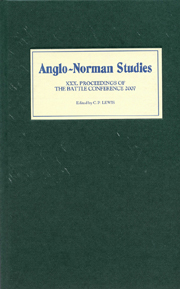Book contents
- Frontmatter
- Contents
- LIST OF ILLUSTRATIONS, MAPS, AND TABLES
- EDITOR'S PREFACE
- ABBREVIATIONS
- The Normans in Welsh History (R. Allen Brown Memorial Lecture)
- William Marshal, Lancelot, and Arthur: Chivalry and Kingship
- Grades of Ordination and Clerical Careers, c. 900–c. 1200
- Evesham J and Evesham L: Two Early Twelfth-Century Manorial Surveys
- Aspects of Church Reform in Wales, c. 1093–c. 1223
- Lay Charters and the Acta of Henry II
- Reinventing Normans as Crusaders? Ralph of Caen's Gesta Tancredi
- Kings, Lords, Charters, and the Political Culture of Twelfth-Century Wales
- Identifying the Warrior on the Pre-Heraldic Battlefield
- St Nicholas the Pilgrim and the City of Trani between Greeks and Normans, c. 1090–c. 1140
- The ‘Resurgence’ of Powys in the Late Eleventh and Early Twelfth Centuries
- Interpreter Families and Anglo-Welsh Relations in the Shropshire-Powys Marches in the Twelfth Century
- A Taste for the Antique? Henry of Blois and the Arts
William Marshal, Lancelot, and Arthur: Chivalry and Kingship
Published online by Cambridge University Press: 12 September 2012
- Frontmatter
- Contents
- LIST OF ILLUSTRATIONS, MAPS, AND TABLES
- EDITOR'S PREFACE
- ABBREVIATIONS
- The Normans in Welsh History (R. Allen Brown Memorial Lecture)
- William Marshal, Lancelot, and Arthur: Chivalry and Kingship
- Grades of Ordination and Clerical Careers, c. 900–c. 1200
- Evesham J and Evesham L: Two Early Twelfth-Century Manorial Surveys
- Aspects of Church Reform in Wales, c. 1093–c. 1223
- Lay Charters and the Acta of Henry II
- Reinventing Normans as Crusaders? Ralph of Caen's Gesta Tancredi
- Kings, Lords, Charters, and the Political Culture of Twelfth-Century Wales
- Identifying the Warrior on the Pre-Heraldic Battlefield
- St Nicholas the Pilgrim and the City of Trani between Greeks and Normans, c. 1090–c. 1140
- The ‘Resurgence’ of Powys in the Late Eleventh and Early Twelfth Centuries
- Interpreter Families and Anglo-Welsh Relations in the Shropshire-Powys Marches in the Twelfth Century
- A Taste for the Antique? Henry of Blois and the Arts
Summary
On his deathbed in May 1219, according to the History of William Marshal, the elderly Marshal spoke feelingly of the fate of his soul:
‘Li clerc sunt vers nos trop engrés,
Trop nos vunt barbiant de pres;
Car j'ai pris .v. cenz chevaliers,
Dont j'ai e armes e destriers
E tot lor herneis retenu;
Se por ço m'est contretenu
Li reignes Dé, n'i a que prendre,
Car je nel porreie pas rendre.
Je ne puis plus fere, ce cui,
A Deu, fors rendre mei a lui
Repentant de toz mes mesfez,
De toz les mals que je ai fez.
S'il ne me volent eschacier,
Avant ne me poent eschacier;
Ou lor argument est ci fals,
Ou nuls hom ne puet estre sals.’
[‘Churchmen are too hard on us, shaving us too closely. If, simply because I've taken five hundred knights and kept their arms, horses, and all their equipment, the kingdom of heaven is closed to me, then there's nothing to be done, for I am unable to return these things. I can do no more as regards God but surrender myself up to him, repentant for all my misdeeds and all the wrongs I have done. If they don't want to destroy me, they can pursue me no further; either their argument is false about this or no man can be saved.’]
This speech captures the disarming frankness and pragmatism of the biographical poem, its apparent ease with the contradictions and conflicts inherent in the lives of twelfth- and thirteenth-century secular aristocrats.
- Type
- Chapter
- Information
- Anglo-Norman Studies 30Proceedings of the Battle Conference 2007, pp. 19 - 40Publisher: Boydell & BrewerPrint publication year: 2008



